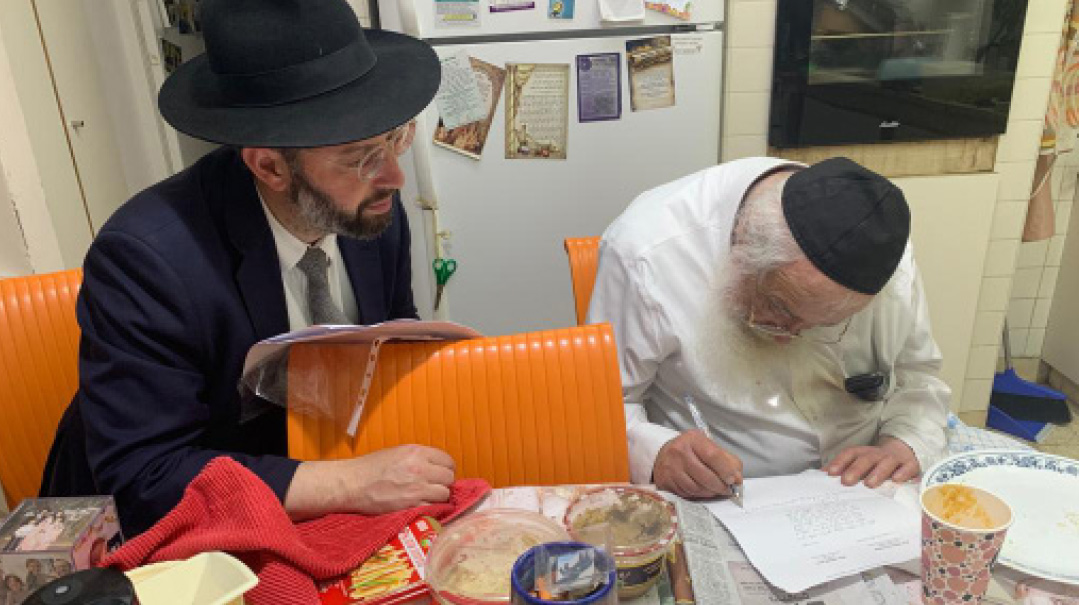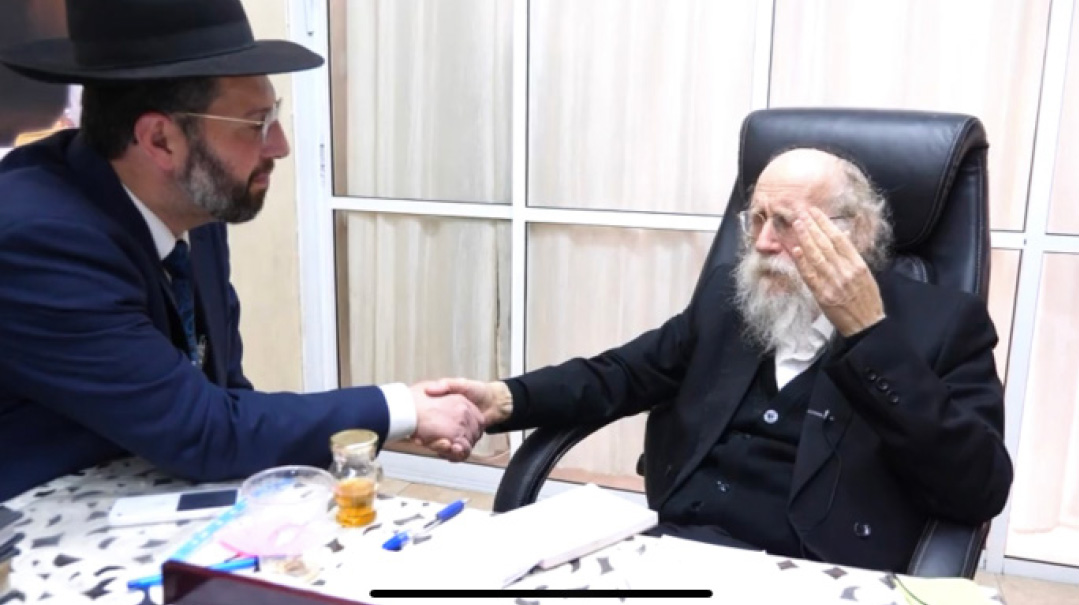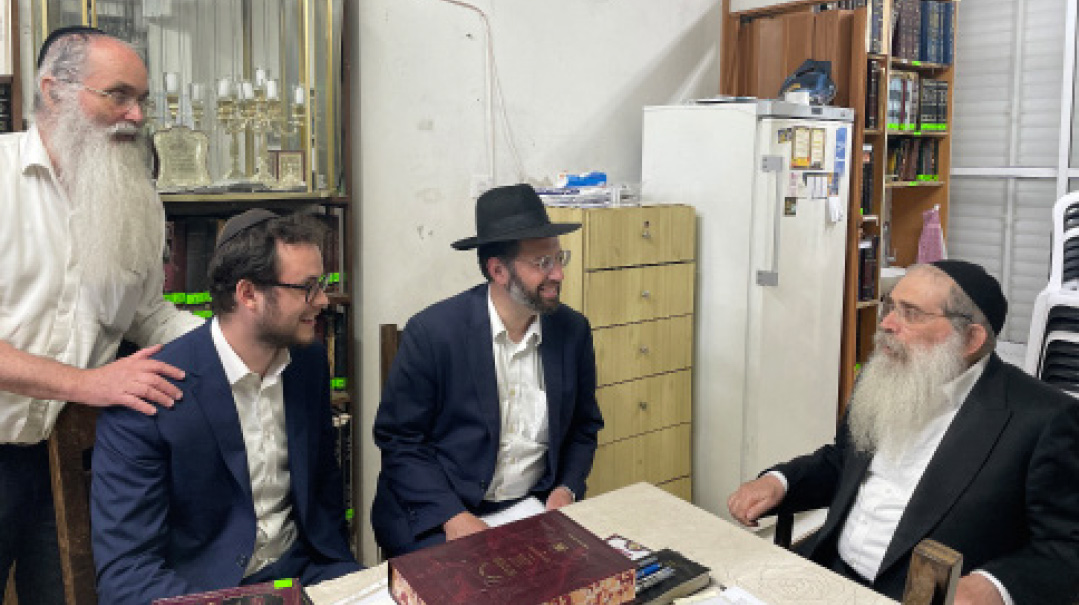Let’s Make a Deal

An innovative pact pairs up modern-day Yissachars and Zevuluns

Photos: Jordan Odinsky and Mrs. Greenblatt
Question: What do a financial planner in Edison, New Jersey, and a posek in Beitar, Israel have in common?
Answer: Everything.
IT all started when venture capitalist Jonathon Triest of Oak Park, Michigan, told a friend, Jordan Odinsky of Ground Up Ventures, about his newest business endeavor: a Yissachar-Zevulun partnership. Jonathon explained that at first, he had been reluctant to take on the major commitment, but he wanted the zechus, and with his rav’s blessing, he agreed to go ahead with it.
“Jonathon, you’ll also see a lot of brachah in your business from this,” his rav said. “Just wait.”
“That would be awesome,” Jonathon replied, “but my motivation is really the zechus of learning, not the money.”
His rav smiled. “You’ll see,” he repeated.
Recounting their conversation, Jordan admits he was skeptical.
“Jonathon tried encouraging me to do it too and told me, ‘The second you sign the shtar, you’re going to see immeasurable brachah in your life. Twelve hours later we had our largest acquisition to date — when PayPal bought one of our companies.’ ”
Well, says Jordan, the evidence was certainly convincing. “Not everyone is going to see a billion-dollar outcome, but there’s no doubt the partnership is a conduit for incredible hatzlachah and brachah,” Jordan says.
That was the first seed for Smach Zevulun.
“It started completely lo lishmah,” Jordan admits. “I also wanted a billion dollar outcome. But then the seeds grew roots.”
Jordan went home and shared the story with his wife, and the two of them started thinking about a similar partnership.
The Start-Up
In the summer of 2015, the Odinskys moved to Eretz Yisrael, eager to embrace what the Land had to offer. The country, the young couple soon found, is overflowing with the kol Torah, the singsong of learning loud enough to drown out a missile siren. Yeshivos nestle on narrow cobbled alleys, shtiblach are situated on every corner, and huge institutions of tefillah and learning stand majestically on random streets, overlooking neighborhoods like proud, watchful parents.
They also realized that many in the Land of Milk and Honey are suffering from dire poverty.
The same avreichim learning with fiery devotion often come home to empty tables, hungry mouths, and financial needs in which their wives’ meager salaries barely make a dent.
Rabbi Yechiel Greenblatt of Jerusalem’s Givat Hamivtar neighborhood was spending most of his waking hours running the Kupat Givat Hamivtar tzedakah organization when he met the young balabos who moved in across the street. The unlikely duo hit it off, becoming close friends, and eventually partners in a groundbreaking initiative.
Rabbi Greenblatt reminisces, “We were walking home from shul one day, and Jordan said he knows people back in the US who are earning great livings and just don’t have the time to sit and learn all day. They’re real givers, supporting many different causes, but sometimes it feels like it isn’t hitting the mark.”
The two agreed that donors would feel more fulfillment if they could provide for lomdei Torah in a direct manner. And so they wondered: Could they create a streamlined system to facilitate and ease the maintenance of such a partnership?
The Yissachar-Zevulun model is an ancient one, dating back to when Yaakov Avinu blessed his sons on his deathbed. He singled out Yissachar and Zevulun as a pair, blessing the former to excel in his Torah study and the latter to succeed as a tradesman, pairing them in a lifelong bond of sharing.
Later, Moshe Rabbeinu reaffirmed their unique bond: “Smach Zevulun b’tzeisecha v’Yissachar b’ohalecha — rejoice, Zevulun, in your excursions, and Yissachar, in your tents.” Rashi relates that Zevulun traveled abroad on merchant ships, using his profits to feed his brother Yissachar, who studied Torah. The Torah places Zevulun’s brachah prior to Yissachar’s, highlighting the unique role of one who facilitates limud haTorah. The Midrash relates that 200 heads of Sanhedrin were direct descendants of Yissachar, and the merit of their learning is attributed solely and completely to Zevulun.
“We realized that this ‘deal’ is not just an ancient blessing but a tangible, realistic possibility for anyone who wants to support a talmid chacham and share the blessings of his learning,” Rabbi Greenblatt explains. “It’s actually discussed in halachah: the Tur, Mechaber, and Rema (Hilchos Talmud Torah, Yoreh Dei’ah, 246) all rule that one who is unable to study Torah at an advanced level should actively support someone who does, and that by allowing the talmid chacham to study without interruption, he brings merit to the benefactor, as if he himself were studying Torah.”
They ran the idea past Meir Rosenwasser, an acquaintance who is a Mir Yeshiva alumnus living in Florida and dealing in real estate.
“He was floored by the concept of a contemporary Yissachar-Zevulun model, convinced that this was the next frontier in supporting limud haTorah,” Rabbi Greenblatt says.
Meir asked them what they needed to get the idea off the ground, and they threw out a pretty ambitious number. To their amazement, Meir agreed, and they used the funds to set up the organization, brand, website, backend infrastructure for partnership support, and general marketing.
Smach Zevulun doesn’t use any partnership funds to operate the organization; every dollar goes directly to the talmidei chachamim. (The only funds deducted from the partnerships are what the banks charge to get the money from the US to Israel.)
With the initial funding in place, the founders worked diligently to create their vision, determined to set up a type of concierge service to facilitate partnerships between lomdei Torah and those looking to support them.
But before jumping in, Rabbi Greenblatt wanted to make sure he and Jordan were really onto something. He discussed the idea with Rav Avigdor Nebenzehal, Rav Shimon Galai, and Rav Shraga Steinman, among other rabbanim. The gedolim were supportive, blessing them with success in the endeavor, and their haskamos appear on the Smach Zevulun website next to a copy of the contract. The contract itself was based on the shtar of the Chazon Ish and enhanced by a renowned talmid chacham in Jerusalem, with significant and precise thought in every word.
Smach Zevulun launched Rosh Hashanah-time with six partnerships. It’s been six months, and they now have 43 Yissachar-Zevulun pairs, each bound by a formal shtar delineating the partners’ roles, with a combined annual support of over $600,000 for the Yissachars and eternal reward for the Zevuluns.

With the endorsement of Rav Avigdor Nebenzahl (top) and Rav Shimon Galai. “You know your money is going exclusively toward your Yissachar and his family. You can account for every single penny you send”
The Personal Factor
I ask the question that’s been niggling at me: Why would someone be interested in such a partnership, rather than simply donating money to a yeshivah, adopting a kollel, or supporting a cheder?
“Please, continue to do all of those things,” Rabbi Greenblatt says emphatically. “Those are wonderful ways to spend maaser money — and very necessary. But the partnership Smach Zevulun is offering is so much more than a donation. It’s an entirely other dimension of giving.”
Jordan elaborates, “For the Zevulun, it’s knowing that your Yissachar’s day-to-day needs are being met. It’s about becoming the foundation for all of the Yissachar’s ruchniyus — his ongoing growth, development, and peace of mind are hinged on your support, so you’re an integral part of something larger than just you. And the Yissachars daven for the prosperity and success of their Zevulun. It’s a committed relationship, plain and simple, and the connection of the partners is the connection of Torah.”
Rabbi Greenblatt adds, “When you donate to a cause, you’re never quite sure if your money went to the talmidim, a rebbi’s salary, or the electricity bill. Again, all these are important expenses. But with Smach Zevulun, you know the money is going toward any and all living expenses for your Yissachar and his family. You can account for every single penny you send.”
He also explains how, while there is certainly value in knowing that all of your funds are going toward the vision, the fulfillment that comes through serving as the “poles of the Aron,” is in and of itself exceptionally rewarding.
“Just as the Aron Habris carried those who carried it, in this partnership, the donor receives in an unparalleled, tangible way: In bringing more Torah to the world, he becomes an active participant in the process,” Rabbi Greenblatt says. “He is not only supporting — he is joining. That is the greatest benefit here.”
Rabbi Greenblatt works full-time running the organization, along with Yishai Friedman, head of Accounting and Compliance, and foundational partner Meir Rosenwasser, and his salary is covered by a donor.
The Yissachars are chosen through a careful, fastidious vetting system. Each potential Yissachar holds a short phone conversation with Rabbi Greenblatt, and if he discerns potential, he’ll invite the candidate for an interview that can last up to two hours. The list of Yissachars includes noted talmidei chachamim, maggidei shiur, poskim, dayanim, and rabbanim.
Jordan is the one who vets the Zevuluns. He says he can sense sincerity in just one simple phone call.
“The second I hear the words, ‘Why can’t he just get a job?’ I know it’s not going to work,” he says.
Some Zevuluns are uncomfortable with the idea of forming a relationship with their Yissachar; what do they have in common with a dayan from Jerusalem?
“The relationship only needs to be as close as they wish.” Jordan says. “I’ve been partners with my Yissachar for three years now, and I have a wonderful relationship with the man, a tremendous talmid chacham and rosh kollel from Ramat Eshkol. I open up to him, we discuss all kinds of things, and he goes out of his way for me whenever necessary.”
When Jordan’s grandfather fell ill several months ago and was put into an induced coma, Jordan reached out to his Yissachar for chizuk and with a plea to daven. The rosh kollel called him several days later to share that he was now waking up at four thirty in the morning, before his haneitz kollel, to daven and learn as a merit for Jordan’s grandfather.
“My grandfather woke up,” Jordan says simply. “He’s back home, he’s well, he’s doing great. Who knows Hashem’s cheshbonos, but I have no doubt that in the merit of my Yissachar’s efforts, my grandfather had a yeshuah.”

With Rav Shimon Galai
A Vessel for Blessing
The Odinskys left Eretz Yisrael in 2020, during the heat of the Covid pandemic.
“It was actually at the seudas preidah for the Odinskys that we first tested out our idea on our friends and neighbors,” remembers Rabbi Greenblatt.
Jordan picks up the story: “I was worried about continuing my shtar after leaving Eretz Yisrael. America is expensive. Between rent and tuition and food and clothes, I was nervous I wouldn’t have enough left over for my Zevulun. But Reb Yechiel reassured me — he said to just believe, and Hashem will show me that it’ll be okay.
“Well, it wasn’t a billion-dollar deal, but I immediately saw how Hashem was ensuring my Yissachar and his family would be taken care of. Every time I doubted my partnership, I’ve seen Yad Hashem clearly using me as a vessel to forward money to the rosh kollel.
“If not me, it would be someone else. Hashem puts more money into my account in order for me to share it with my Yissachar,” Jordan says.
“All the Zevuluns see it, and they share the stories with me,” Rabbi Greenblatt adds. “One Zevulun called me last year and told me how meaningful his partnership is, so I asked him if he’d consider taking another one. I sent him the profiles of two choshuve Yissachar options, expecting him to choose one, but he asked me to sign him up for both. He clearly sees the brachah and parnassah that flows forth from his shtar.”
Most people sign up for $1,500 a month, an amount that reflects current living expenses in Eretz Yisrael, but some people do more. Jordan tells me about a successful businessman who reached out to hear more about Smach Zevulun and then committed to giving $3,600 a month to his Yissachar. He also asked Jordan to sign up each of his three sons for $1,500 monthly.
Rabbi Greenblatt tells me about another Zevulun who called to increase his monthly donation. He wasn’t very learned himself, but he strongly believed in the koach of limud haTorah, and he’d seen such brachah after entering the partnership that he wanted to offer more.
“People eventually up their number,” Rabbi Greenblatt says, “but no one ever goes lower.”
It’s not just businessmen who sign up to be Zevuluns. Rabbi Greenblatt tells about a choshuve rav who signed up and partnered with a distinguished posek in Eretz Yisrael. He’s happy to support the posek, and even happier to have a direct line of communication with his esteemed Yissachar.
Isaac, a newly married businessman, is eager to share his Smach Zevulun experiences. He explains that it’s his first year out of the beis medrash and in the workforce, and it was important to him and his new wife to allocate their maaser money to support Torah learning. When he came across the Smach Zevulun website he was intrigued by the concept, and he reached out to Jordan, who promptly sent him several options. He felt a connection with one of the options right away.
“He’s a masmid with a particular love for halachah. He gives halachah shiurim near the yeshivah I attended during my years in Israel,” Isaac muses. “It all resonated with me. I’d also requested an English speaker, as I wanted to be able to have a genuine kesher with my Yissachar. We organized a chavrusashaft in hilchos basar b’chalav, and as my wife and I figure things out in our kitchen, we have a direct line with him for all of our sh’eilos. It’s a tremendous zechus to learn with him, and I review what I’ve learned afterward with my wife.”
Mordechai, a New Jersey balabos, took time every morning to be kovei’a itim laTorah. Business was slow, though, and finances were tight. So when Jordan asked if he wanted to be a Zevulun in a contemporary Yissachar-Zevulun partnership, he almost laughed.
“It won’t work out,” he said to Jordan. “I’m short on income at the moment.”
Undeterred, Jordan told him more about the program anyway. When Mordechai heard who was partnering with Jordan on this initiative, he stopped short.
“Yechiel Greenblatt, Rav Nota Greenblatt’s grandson, is your partner?”
Jordan nodded, surprised.
“Sign me up,” Mordechai responded without hesitation.
Jordan felt compelled to remind the young businessman that a minute ago he’d said he had a cash flow issue.
Mordechai shrugged. “I’ll work it out. If not for Rav Nota, my father would never have become frum, and who knows where we’d be today.”
After that, Mordechai convinced his brother to join him, and the two have a joint partnership with a talmid chacham in Eretz Yisrael.
“I bought in, and I bought in hard,” he says. “I saw brachah in all areas of my life almost right away. I’d started a new job, and things were improving in a manner that didn’t even make sense. So I started pushing my friends to sign up, too,” he says.
To date, Mordechai has encouraged four other partnerships. The fact that the Zevuluns are not philanthropists or extremely wealthy individuals, just regular businessmen who are proud to support Torah learning, resonates strongly.
“This isn’t just a nice idea. This is a way to dedicate your life and livelihood toward Torah, and a chance for my kids to see me put my money where my mouth is, literally. Instead of preaching about living a higher life but then spending on things I want materialistically, they see me putting my money toward something greater. To tell you the truth, I’ve upgraded my ruchniyus since signing up. It’s like a boost in the right direction, and I feel it in every aspect of my life.”

Jordan and Reb Yechiel discuss contract details with Rav Shraga Steinman. The contract itself was based on the shtar of the Chazon Ish
Filling the Tank
From the other side of the shtender is Rav Tzvi, an esteemed talmid chacham, who hadn’t heard of the program until he was approached. He says he was impressed with the fact that the money is purely a transfer between the two men, not used to cover expenses.
He did grapple with joining, he explains. “The truth is, it’s hard to understand why someone would make such a deal. It’s like an artist reluctant to part with one of his paintings. My Torah is a part of me — it’s my everything. And I should agree to sell it for some income?” he says. “The Rema’s lashon, when I looked it up, was astounding. The Zevulun, the one supporting the Yissachar — it’s as if he himself is learning. The Torah says you need to make yourself a midbar, to distance yourself from things, in order to acquire Torah. Yet if someone is in the business world and owns houses and cars, he is still considered a midbar if he is a supporter of Torah, and he, too, acquires the limud haTorah. It’s an incredible thing. Imagine if everyone would realize that with their money, they could acquire the nitzchiyus of hours of learning. Reb Yechiel and Jordan tapped into this, and it’s tremendous.
“Rav Moshe Feinstein ztz”l writes that you can’t view the contract as ‘selling Olam Haba for money.’ Rather, it’s like a car that needs to get over a bridge and the Zevulun fills its tank. Or a soldier who needs to go to war — the Zevulun is the weapons maker. He’s as necessary for the process as the Yissachar is.”
Rav Tzvi met his Zevulun for the first time a short while ago. “We sat in a park, strangers yet partners, and he told me how three days after he signed the contract, a shidduch came up for him after months of waiting. He got engaged shortly afterward. He connected himself to something, and that connection brought on brachah.”
Rav Tzvi says he’d actually been approached several times with a similar offer, but this was the first time he felt comfortable accepting. “The contract is so precise, so specific, and when they needed to change something, they called me to ask me if it was alright. The manner in which Reb Yechiel and Jordan dignify and honor the process makes it so special to be a part of this,” he says.
Rav Meir also shares his experience as a Yissachar. “Three years ago, I found myself with a debt of thousands of shekels that was just growing bigger every month, and I didn’t know how to extricate myself. Then out of the blue, Reb Yechiel called me to ask if I wanted to be a partner with Smach Zevulun. The Hashgachah was incredible. I researched it, read what Rav Moshe Feinstein wrote on the concept, and realized this isn’t bedieved, this isn’t tzedakah. This is l’chatchilah, an amazing thing to be part of.
“The yishuv hadaas it’s brought me and my family has taken my learning to a new level. In general, I find myself uplifted by the partnership. I realize I’m not learning for just me anymore, I’m learning for someone else as well, and that gives me the chizuk to push on even if I was ready to close the Gemara for the day. My Zevulun is such a special person with a special family, and I’m honored to partner with him. Just feeding my children is an expensive task, and the menuchas hanefesh this lends me is immeasurable.
“Rav Moshe wrote that each person is mechuyav to learn kol haTorah kulah. Yet even if a person wouldn’t do a single other thing, he still would barely be able to do so. And a person needs to make a living and take care of his family. So how can this be? It has to be that someone else takes care of all of those things while one person learns, and a partnership is really the only way to achieve this.”
Make Me a Match
Rabbi Greenblatt tells me about the time someone thought he was a shadchan.
“So Jordan arranged for me to speak on Radio Kol Chai,” Rabbi Greenblatt says. “It was a nice experience, and we did create a few partnerships through that presentation. And then one day I get a phone call from a young woman who had tuned in to the show only in the middle and heard me saying I was a ‘shadchan,’ so she worked up the courage to call me! I gave her a brachah, and I hope she found her zivug.”
But Smach Zevulun really is involved in shadchanus, matching the lomdei Torah and their supporters. Rabbi Greenblatt explains that the mitzvah of limud haTorah is the only mitzvah that two people can do together. “Like two people carrying the Aron Habris,” he explains. “Rav Shraga Steinman said in the name of his father that the Gemara in Kesubos writes that those who are not involved in limud haTorah will not merit to rise during techiyas hameisim. The Gemara concludes that those who support talmidei chachamim will merit to rise then. Rav Steinman explained that this is why the Torah designed Yissachar-Zevulun partnerships.
“When I was sitting in kollel in Dushinsky,” Rabbi Greenblatt continues, “there were two dayanim who would learn right in front of me, one American, one Israeli. Jordan and I were just getting started then, and I approached one dayan, the American one, and asked him if he’d be interested in being a Yissachar. He said it wasn’t for him, but maybe it could work for his chavrusa, who is an Israeli dayan, a tremendous talmid chacham, and has 14 children at home.
“This American man told me that his chavrusa was spending his afternoons managing apartments around the Geula area as a way to bring in some parnassah. I couldn’t believe that he had to go out to work — he so obviously just wanted to sit and learn. So I asked him, and he happily agreed to a partnership. His Zevulun sends $2,000 a month, which allowed him to quit the property management side job and focus on his learning. As a result of the additional learning seder, he’s about to finish Choshen Mishpat with notes, and he’s written a sefer with his Dushinsky chavrusa.”
Jordan remembers that back when he was learning in Netiv Aryeh, in Rav Aharon Binah’s office, there was a large frame on the wall with the words, “Rennert’s Revolution.”
“Inside the frame is a map with a small dot wherever Ira Rennert, the Jewish billionaire, donated or created something for the Jewish community,” he says, “Yeshivah in Israel? Dot. Donated a sefer Torah? Dot. So many dots, all over the map.”
Jordan pauses.
“Can you imagine?” he says, after a moment. “All those dots. An entire revolution. I used to look at it when visiting my rebbi. And I’d wonder what revolution I would make one day. And now I know.
“You don’t have to be a billionaire to start a revolution. You just need to do your best to make real change, to impact the lives of those around you for the better. Smach Zevulun is our revolution. And we’re proud of it, because with each partnership we facilitate, not only do we add a dot to our own map, but we help the Zevuluns and their families build maps of their own.”
(Originally featured in Mishpacha, Issue 953)
Oops! We could not locate your form.







